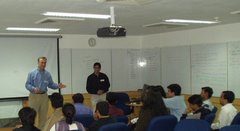
Profitable Growth - a Book By Ram Charan
I picked up Ram Charan's book called Profitable Growth. As I was reading his points, it struck me that this book is about looking "what can be." It is a book about creating the future of a business.
I would not call the book powerful in any sort of way. (Sorry Ram, you are far smarter than I could ever be). But I would say, it's a book that sales and marketing professionals have been waiting for. It is a book about how to take risks to drive top line growth. Anyone who is not an accountant or an HR exec or contracts person will appreciate the fact that businesses spend far too much time with "how do eliminate this little expense here and there." I am a spendthrift, so don't get me wrong. But sometimes I think about how we spend money unwisely in one area and then in another area, like, hiring great sales professionals, we penny-pinch.
I have been working in sales, and business development practically all my life. Recently, over the past 7 years, I have been turning around sales organizations and building new revenue streams. Start-ups within companies is hard work. People are impatient - the people at the top. They go with great gusto, saying "Yes! We need more revenue. About ....hmmmm.... 90 days later, they go, "Where's the revenue? Look at this cost! Do you know how much would go to the bottom line?"
Ram Charan makes his case for growth. He has 10 "essential" tools (really appraches - and mindsets - not really tools like a spreadsheet or a spade - for you people who want "hard" and tangible things).
He talks about hitting singles and doubles, rather just trying to hit home runs every time. I think this is a great expression. Too often management is looking for the quick hit - a home run, a grand slam in some cases. But in reality, give me singles and doubles often enough and I will out score the company hell bent on the big hit - the home run. Why? Because often the supporting mechanisms inside the company cannot support the grand slam and the deal goes south and profitability is impacted. Give me a double and that is enough for the inner workings of the company to get ready and support this smaller endeavor. Once they know how to support this piece of work, they may be ready to hit the homer.
Anyway, get the book. It makes the case, in my point of view, for sales and marketing and how to drive more revenue by focusing peoples' attention, time, and money on growth, and how to do so, without jumping across the Grand Canyon in a single leap. And more importantly, it's from a true consultants' perspective, someone who gets paid a lot of money to advise the best and the brightest.
PS - if you don't know Ram, he is a consultant to the biggest and best companies in the world. His advice is sought after by many CEOs and top executives on how to build a business. Ram is self effacing, but serious. He travels about 350 days a year - helping companies see the obvious and frame situations for managers to understand what they have to do, rather than what they think they should be doing.












